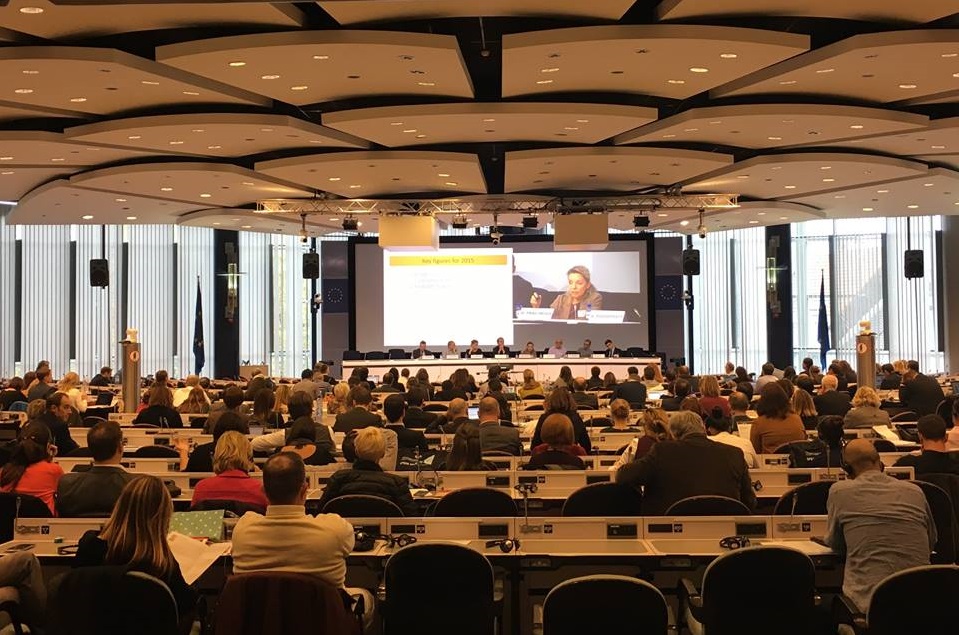
Images: Speak-Up Conference in Brussels. Photo: Slavko Ćuruvija Foundation
Commissioner Hahn reiterated at the Speak-Up Conference that the issue of media freedom is central to Serbia’s EU integration process. Among some participants, however, criticism could be heard that the pressures on the government are ineffective and no progress has been made in the fight for greater media freedom and freedom of expression
Around 400 journalists, media analysts, experts, civil society representatives and decision makers from EU candidate and potential candidate countries, as well as experts from international, regional and national organisations, all had the opportunity to exchange their experiences in Brussels last week, at the third edition of the “Speak Up” conference on freedom of expression and the media in the Western Balkans and Turkey.
Three panel discussions, organised by the European Commission’s Directorate for Neighbourhood Policy and Accession Negotiations, saw a number of problems highlighted:
– unsafe environment for journalists,
– disappearance of investigative journalism,
– political and economic pressures on journalists and editors, resulting in a lack of objective reporting,
– non-transparent ownership structure and concentration of power in the media,
– lack of independence of the judiciary in prosecuting attacks on journalists.
EU Enlargement Commissioner Johannes Hahn, opening the conference, said that media freedom is a central issue of the integration process in the EU; that this issue cannot be negotiated, and that governments must guarantee a secure environment in which different opinions can be expressed and in which all citizens have access to objective information based on facts.
The EU progress report is not sufficiently critical of the authorities and does not reflect the actual situation in the media. From the perspective of journalists, I would like for the conclusions of the conference to have a greater impact on the work of our government, which still shows no desire to change anything, while the situation is getting worse and censorship is increasing. (Predrag Blagojević)
Media representatives from the countries of the region noted that a strong regulatory framework is required in order to overcome the long-standing problem in this area.
Among some conference participants, however, criticism could be heard that no progress has been made in the fight for greater media freedom and freedom of expression and thart the pressures on the government are not sufficiently effective.
Speaking to Cenzolovka, editor of Južni vesti (Southern News), Predrag Blagojević, said that the previous two “Speak Up!” conferences also included the same complaints against censorship from media workers, and that the media situation in the country is worse, and that the European Commission is not sufficiently critical of the work of the Serbian government.
“These kinds of events often boil down to us complaining to one another, and in the end we don’t know what the conclusion is, or how the conference helps us. My impression is that the EU Progress Report is not sufficiently critical of the authorities and does not reflect the actual situation in the media. From the perspective of journalists, I would like for the conclusions of the conference to have a greater impact on the work of our government, which still shows no desire to change anything, while the situation is getting worse and censorship is increasing,” said Blagojević.
He assessed Commissioner Hahn’s recommendations as being good, but said that in reality Serbia is getting worse in terms of the media situation, warning that the Media Sustainability Index 2015 (https://www.irex.org/resource/serbia-media- sustainability-index-msi) in the country is lower than it was in 2000, when the situation was at its worst.
Dinko Gruhonjić, from the Independent Journalists’ Association of Vojvodina, said the impression was that the last conference, held two years ago, had been more effective, because it had been dedicated to formulating a media strategy for the 2014-2020 period, thus it had strategic importance not only for the region, but also for the European Union itself.
“The conclusions of the conference may not be strong enough, as was expected, but it certainly has a positive effect. And there was at least dialogue, although it could have been more constructive” (Milan Antonijević)
“Perhaps we should consider for future conferences that one day is not enough to discuss the problems in the region, or we should consider the possibility of the event being held in one of the countries of the Western Balkans, because it would make more of an impression, be more convincing and closer to the decision makers in the region, who are obstacles to the freedom of the media in these countries,” said Gruhonjić.
The essential message, he added, is that the EU can be our ally in our countries’ EU accession processes, given the fact that there are different mechanisms to direct the authorities in the region towards the establishing of the standards of the civilised world in relation to the media.
“That’s because when a country finally becomes an EU member, these mechanisms cease to be implemented, which we can see in the case of Hungary and its current relations with the media.“
“The good news from this conference is the fact that we have all gathered together and determined that our problems with the governments are more or less the same, although with differences in intensity, given that the repression in Turkey is much stronger and that some of our colleagues there are in jail,” said Gruhonjić.
The director of the Lawyers Committee for Human Rights, Milan Antonijević, considers that the conference is nevertheless important for the democratic process, because much could be heard about threats to media freedom.
“The conclusions of the conference may not be strong enough, as was expected, but it certainly has a positive effect. And there was at least dialogue, although it could have been more constructive,” he said.
Four years have passed since the first “Speak Up!” conference, and similar messages could be heard back then, said Antonijević, who considers that a solution is still being sought, but it’s good to hear that.



 Silovanje ili cenzura: Na šta to smrdi Pepe le Tvor?
Silovanje ili cenzura: Na šta to smrdi Pepe le Tvor? Saragusti: Niko sada nije bezbedan. Zločini su jezivi. Novinari su ubijeni dok obavljaju svoj posao
Saragusti: Niko sada nije bezbedan. Zločini su jezivi. Novinari su ubijeni dok obavljaju svoj posao Kako ojačati lokalne medije i obnoviti informisanje o radu opštinskih vlasti: Britansko rešenje daje rezultate
Kako ojačati lokalne medije i obnoviti informisanje o radu opštinskih vlasti: Britansko rešenje daje rezultate
Ostavljanje komentara je privremeno obustavljeno iz tehničkih razloga. Hvala na razumevanju.